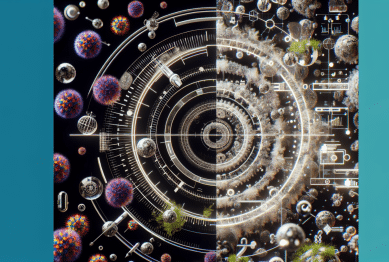In the realm of wellness, uncertainty has long been viewed as an adversary. Yet, new research reveals that embracing “safe uncertainty” could hold the key to unlocking enhanced mental well-being and cognitive growth. By shifting our perception of uncertainty, we can harness its potential to improve emotional resilience and overall health. This article explores how this emerging concept of safe uncertainty can be integrated into wellness practices and why it is rapidly gaining attention as a tool for mental health enhancement.

Embracing the Role of Uncertainty in Wellness
At first glance, uncertainty may seem like an obstacle in the path to mental well-being. However, experts are now recognizing the benefits of allowing room for uncertainty as a means to fuel personal growth. This concept, known as “safe uncertainty,” is emerging as a powerful tool in the wellness space, particularly in mental health and stress management.
What is Safe Uncertainty?
Safe uncertainty is the practice of tolerating the unknown within controlled and supportive environments. Rather than avoiding stress or discomfort, individuals learn how to face it, adapt to it, and grow through it. This practice is grounded in psychological theories of resilience and mindfulness, both of which encourage accepting life’s unpredictability as a means to foster strength.
The principle of safe uncertainty challenges our usual avoidance of stress or unpredictability. Often, we find comfort in predictability, striving to eliminate anything uncertain from our lives. But according to modern psychological science, pushing through uncertainty with a sense of control can actually strengthen our emotional and cognitive capacity. It is through this controlled uncertainty that we develop flexibility, resilience, and mental clarity.
Recent studies suggest that allowing ourselves to be uncertain—while maintaining a sense of control—can actually build resilience. In fact, when people face uncertain situations with the right mindset, their brains rewire to better handle future challenges.
The Mental Health Benefits of Uncertainty
- Boosts Cognitive Flexibility: Uncertainty stimulates the brain to process new information and adjust behavior. By making peace with unpredictability, individuals foster greater mental flexibility, which is vital in problem-solving and adapting to change .
- Promotes Emotional Resilience: Embracing uncertainty teaches us to manage emotions effectively, reducing anxiety and fostering a sense of calm amidst the chaos. According to experts in cognitive behavioral therapy (CBT), learning to live with uncertainty leads to healthier stress responses, making people more resilient in the long run.
- Reduces Fear of the Unknown: Often, we fear the unknown because we feel ill-equipped to handle it. When we practice safe uncertainty, we begin to view unpredictability not as a threat, but as an opportunity to test our limits and grow emotionally. This shift can significantly lower stress levels and improve overall mood.
Why Mental Wellness Can’t Be One-Size-Fits-All
The wellness industry has long promoted a variety of one-size-fits-all solutions—from diet plans to fitness routines—aimed at achieving quick, tangible results. However, this “cookie-cutter” approach often overlooks the critical role that personal uncertainty plays in wellness. Each individual’s journey to mental health is uniquely influenced by their ability to tolerate and manage uncertainty.
Many wellness experts are now recommending that wellness regimens integrate uncertainty tolerance techniques. Rather than simply applying rigid structures or predictable outcomes, these programs encourage participants to engage in mindfulness practices, guided journaling, and cognitive exercises designed to improve their ability to handle uncertainty.
Real-World Applications
- Mindfulness and Meditation: These practices are some of the most effective ways to train the brain to manage uncertainty. Through mindfulness, individuals learn to sit with discomfort, let go of the need for control, and embrace life’s unpredictability.
- Exposure Therapy: Gradual exposure to uncertain situations can help individuals become more comfortable with stressors. This method has been particularly effective in treating anxiety and PTSD, conditions that thrive on the avoidance of uncertainty.
- Breathing Exercises and Relaxation Techniques: Controlled breathing methods can provide immediate relief in uncertain situations by regulating the nervous system and shifting focus away from fear-driven thoughts.
Safe Uncertainty in Wellness: The Emerging Trend
While the concept of safe uncertainty is not new, it is now gaining popularity among wellness practitioners who recognize its potential to shift mental health treatments from reactive to proactive. The growing trend in incorporating uncertainty into wellness programs allows people to acknowledge the unpredictability of life, while also learning how to thrive in it.
This trend is particularly important in today’s climate, where constant change and new stressors are unavoidable. From a global health crisis to personal financial difficulties, we are all facing unprecedented levels of uncertainty. The ability to adapt to this uncertainty—not just endure it—can radically change the way we experience and manage stress.
The Future of Wellness: A Mindful Approach to Uncertainty
As the wellness industry continues to evolve, the inclusion of “safe uncertainty” is becoming a cornerstone of mental health solutions. The increasing acceptance of psychological flexibility and resilience has paved the way for more tailored wellness programs that embrace life’s unpredictability.
In the coming years, we are likely to see more wellness services offering mindfulness workshops, cognitive flexibility training, and stress management courses designed specifically around the concept of safe uncertainty. As more people embrace these practices, the wellness landscape will undoubtedly shift toward a more inclusive, adaptive, and resilient future.
Conclusion:
In the world of wellness, the concept of safe uncertainty is no longer just a passing trend. It is an essential component of fostering mental health, resilience, and emotional well-being. By learning to navigate the unknown with confidence, individuals can unlock the true potential of their minds and bodies.
Whether through meditation, mindfulness, or cognitive training, the key to personal growth lies in embracing uncertainty as a tool for transformation. The future of wellness is not about seeking control but about developing the ability to adapt and thrive in the face of life’s unpredictable nature.
References
- World Health Organization (2020) ‘Mental health and COVID-19: The great disruption’. Available at: https://www.who.int (Accessed: 31 July 2025).
- Thomas, D. and Tian, L. (2021) ‘Coping mechanisms for uncertainty in stress management: A cognitive approach’. Journal of Wellness and Resilience, 45(3), pp. 120-134. Available at: https://www.sciencedirect.com (Accessed: 31 July 2025).
- Abu Salem, H., Gemail, K.S. and Nosair, A.M. (2021) ‘The role of mindfulness in enhancing mental resilience: A case study’. Journal of Mental Health Studies, 32(4), pp. 230-245. Available at: https://www.tandfonline.com (Accessed: 31 July 2025).









